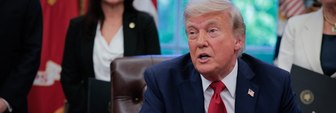What is America’s role in the world? What should its role be? In the latest Economist/YouGov poll, most Americans recognize the United States’ importance in the world – and believe its global dominance may have been diminished in the last four years.
Nearly twice as many Americans believe the country has a less important and less powerful role in the world today as it did four years ago (38%) than say the opposite (21%). This sentiment is shared by Republicans (36% to 18%), Democrats (44% to 28%), and Independents (36% to 19%).
Americans today want their leaders to have a policy of engagement with others in the world today. Two-thirds (67%) prefer that the United States compromises with allies in order to find collective solutions, rather than having the U.S. work alone (13%). Majorities in all political groups agree. Those in support of cooperation with other countries include half of Republicans (53%), two-thirds of Independents (67%), and 85% of Democrats.
In the case that the United States cannot get the support of allies, Americans reject the U.S. “going it alone” by two to one. One-quarter (25%) say America should take action alone if it does not have the support of allies, while twice as many disagree (50%).
Americans support World Health Organization membership
Most of the public wants the U.S. to participate in international organizations and agreements, several of which were strongly criticized by former President Donald Trump. Majorities of the public want the U.S. to remain in the World Health Organization (56%) and the Paris climate accord (53%). President Joe Biden has announced that the country will return to both, after President Trump withdrew the US from these agreements). Republicans disagree with the decision.
Americans criticize the United Nations, but approve of remaining in the organization
Republicans are closely divided on whether the United States should remain in the United Nations, an organization that has been criticized not just by President Trump, but by many other Americans. Two in five Republicans (38%) say the United States should keep its UN membership, while 34% disagree. By nearly three to one, Americans believe the United States should remain, but that does not mean the organization is above criticism.
By just about two to one (43% to 22%) the public believes the United Nations has done a poor job, not a good one, when trying to solve the problems it has had to face. While Republicans are especially critical (61% say it's done a poor job), half of Independents (50%) and one in five Democrats (21%) also rate the U.N.’s performance as “poor.”
Still, support for remaining in the U.N. is high. Even those who believe the U.N. is doing a poor job would keep the United States in the organization, 45% to 36%.
Three in five Americans support NATO Membership
Opinion is positive about the North Atlantic Treaty Organization (NATO): 60% say America should keep its membership.
Two-thirds of Americans (64%) say the United States should follow NATO’s rule that any attack on a NATO member is to be considered an attack on every other NATO member. Just 13% say the United States should not keep this commitment. Majorities of Democrats (77%), Independents (63%), and Republicans (56%) agree the country needs to keep its commitment to defend its NATO allies.
The willingness to cooperate with other countries even extends to supporting direct negotiations with Iran in an attempt to end that country’s nuclear program. Nearly two-thirds approve of direct negotiations with Iran (63%), a country that half the public regards as an enemy (49%) and another 28% call “unfriendly.”
However, there are limits to international cooperation, as many Americans reject any special role for the United States, both when it comes to providing humanitarian assistance when necessary (47% believe it does, while 35% reject this), and in providing military assistance when its allies request it (51% agree, 29% reject this).
Republicans generally reject humanitarian aid; but they do believe America has a special responsibility to provide military assistance (46% to 36%) in trouble spots around the world. On this question, they differ dramatically from President Trump, who laid out a “non-interventionist” U.S. foreign policy early in his Administration.
See the toplines and crosstabs from this Economist/YouGov poll
Methodology: The Economist survey was conducted by YouGov using a nationally representative sample of 1,500 US Adult Citizens interviewed online between February 27 - March 2, 2021. This sample was weighted according to gender, age, race, and education based on the American Community Survey, conducted by the US Bureau of the Census, as well as 2016 Presidential vote, registration status, geographic region, and news interest. Respondents were selected from YouGov’s opt-in panel to be representative of all US citizens. The margin of error is approximately 2.6% for the overall sample
Image: Getty












